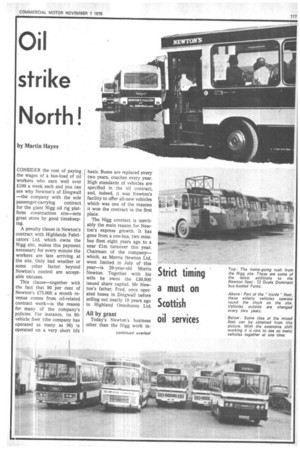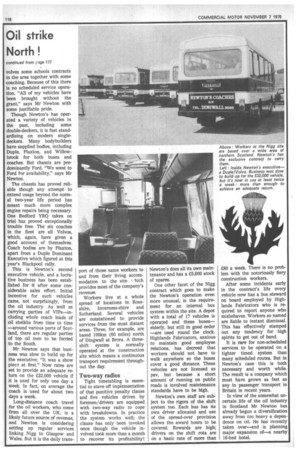Oil strike North!
Page 119

Page 120

If you've noticed an error in this article please click here to report it so we can fix it.
by Martin Hayes
CONSIDER the cost of paying• the wages of a bus-load of oil workers who earn well over £100 a week each and you can see why Newton's of Dingwall —the company with the sole passenger-carrying contract for the giant Nigg oil rig platform construction site—sets great store by good timekeeping.
A penalty clause in Newton's contract with Highlands Fabricators Ltd, which owns the Nigg site, makes this payment necessary for every minute the workers are late arriving at the site. Only bad weather or some other factor beyond Newton's control are acceptable excuses.
This clause—together with the fact that 90 per tent of Newton's £75,000 a month revenue comes from oil-related contract work—is the reason for many of the company's policies. For instance, its 80vehicle fleet (the company has operated as many as 96) is operated on a very short life basis. Buses are replaced every two years, coaches every year. High standards of vehicles are specified in the oil contract, and, indeed, it was Newton's facility to offer all-new vehicles which was one of the reasons it won the contract in the first place.
The Nigg contract is inevitably the main reason for Newton's express growth. It has gone from a one-bus, two minibus fleet eight years ago to a near Elm turnover this year. Chairman of the company— which, as Morris Newton Ltd, went limited in July of this year—is 29-year-old Morris Newton. Together with his wife he owns the £30,000 issued share capital. Mr Newton's father, Fred, once operated buses in Dingwall before selling out nearly 10 years ago to Highland Omnibuses Ltd.
All by grant
Today's Newton's business other than the Nigg work in vctives some schools contracts in the area together with some coaching. Because of this there is no scheduled service operation. "All of my vehicles have been brought without the grant," says Mr Newton with some justifiable pride.
Though Newton's has operated a variety of vehicles in the past, including some double-deckers, it is fast standardising on modern singledeckers. Many bodybuilders have supplied bodies, including Duple, Plaxton, and Willowbrook for both buses and coaches. But chassis are predominantly Ford. "We went to Ford for availability," says Mr Newton.
The chassis has proved reliable though any attempt to extend usage beyond the normal two-year life period has meant much more complex engine repairs being necessary. One Bedford YRQ taken on trial has proved exceptionally trouble free. The six coaches in the fleet are all Volvos, which, again, have given a good account of themselves. Coach bodies are by Plaxton, apart from a Duple Dominant Executive which figured at this year's Blackpool rally.
This is Newton's second executive vehicle, and a lucrative business has been established for it after some considerable sales effort. Initial incentive for such vehicles came, not surprisingly, from the oil industry. As well as carrying parties of VIPs—including whole coach loads of oil sheikhs from time to time —around various parts of Scotland, there are regular parties of top oil men to be ferried to the South.
Mr Newton says that business was slow to build up for the executive; "It was a show piece at first." Now rates are set to provide an adequate return on the £32,000 vehicle if it is used for only one day a week. In fact, on average the coach is used for about two days a week.
Long-distance coach travel for the oil workers, who come from all over the UK, is a likely future source of revenue, and Newton is considering setting up regular services linking Nigg to Glasgow and Wales. But it is the daily trans part of those same workers to and from their living accommodation to the site -hich provides most of the company's revenue.
Workers live at a whole spread of locations in Rossshire, Inverness-shire and Sutherland. Several vehicles are outstationed to provide services from the most distant areas. Three, for example, are based 100km (60 miles) north of Dingwall at Brora. A threeshift system is normally operated at the construction site which means a continuous transport requirement throughout the day.
Two-way radios
Tight timetabling is essential to stave off implementation of that punitive penalty clause and five vehicles driven by foremen/drivers are equipped with two-way radio to cope with breakdowns. In practice the system works well; the clause has only been invoked once though the vehicle involved took more than a month to recover its profitability! Newton's does all its own maintenance and has a £5,000 stock of spares.
One other facet of the Nigg contract which goes to make the Newton's operation even more unusual, is the requirement for an internal bus system within the site. A depot with a total of 17 vehicles is operated and these buses— elderly, but still in good order —are used round the clock. Highlands Fabricators, anxious to maintain good employee relations, has decreed that workers should not have to walk anywhere so the buses cover a good distance. These vehicles are not licensed as psv, but because a short amount of running on public roads is involved maintenance standards have to be high.
Newton's own staff are subject to the rigors of the shift system too. Each bus has its own driver allocated and use of the spread-over provision allows the award hours to be covered. Rewards are high; drivers on the shift rota are on a basic rate of more than £80 a week. There is no problem with the notoriously fiery construction workers.
After some incidents early in the contract's life every vehicle now has a bus steward on board employed by Highlands Fabricators who is required to report anyone who misbehaves. Workers so named are liable to instant dismissal. This has effectively stamped out any tendency for high spirits to get out of hand.
It is rare for non-scheduled services to be operated on a tighter timed system than many scheduled routes. But in Newton's case this is both necessary and worth while. The result is a company which must have grown as fast as any in passenger transport in Britain in recent years.
In view of the somewhat uncertain life of the oil industry in Scotland Mr Newton has already begun a diversification away from too heavy a dependence ,on oil. He has recently taken over—and is planning major expansion of—a nearby 16-bed hotel.
















































































































































































































